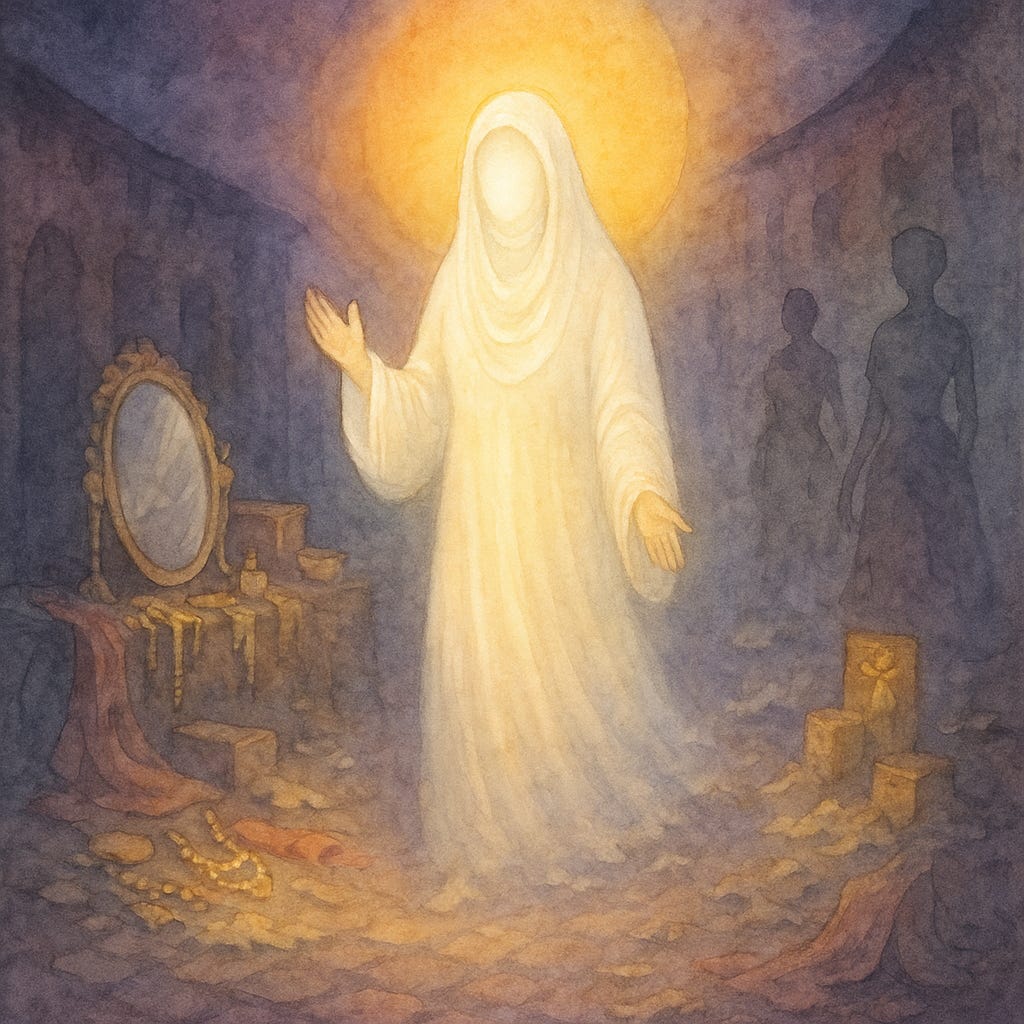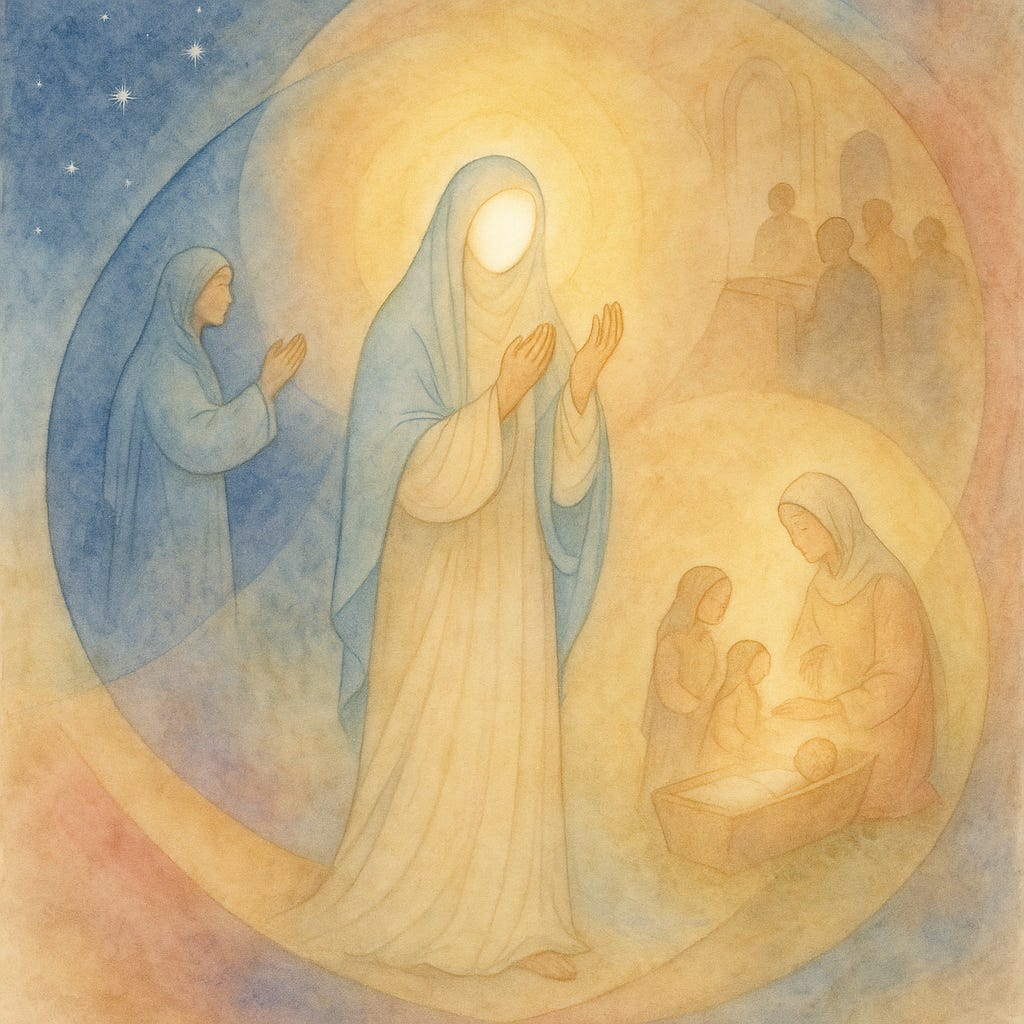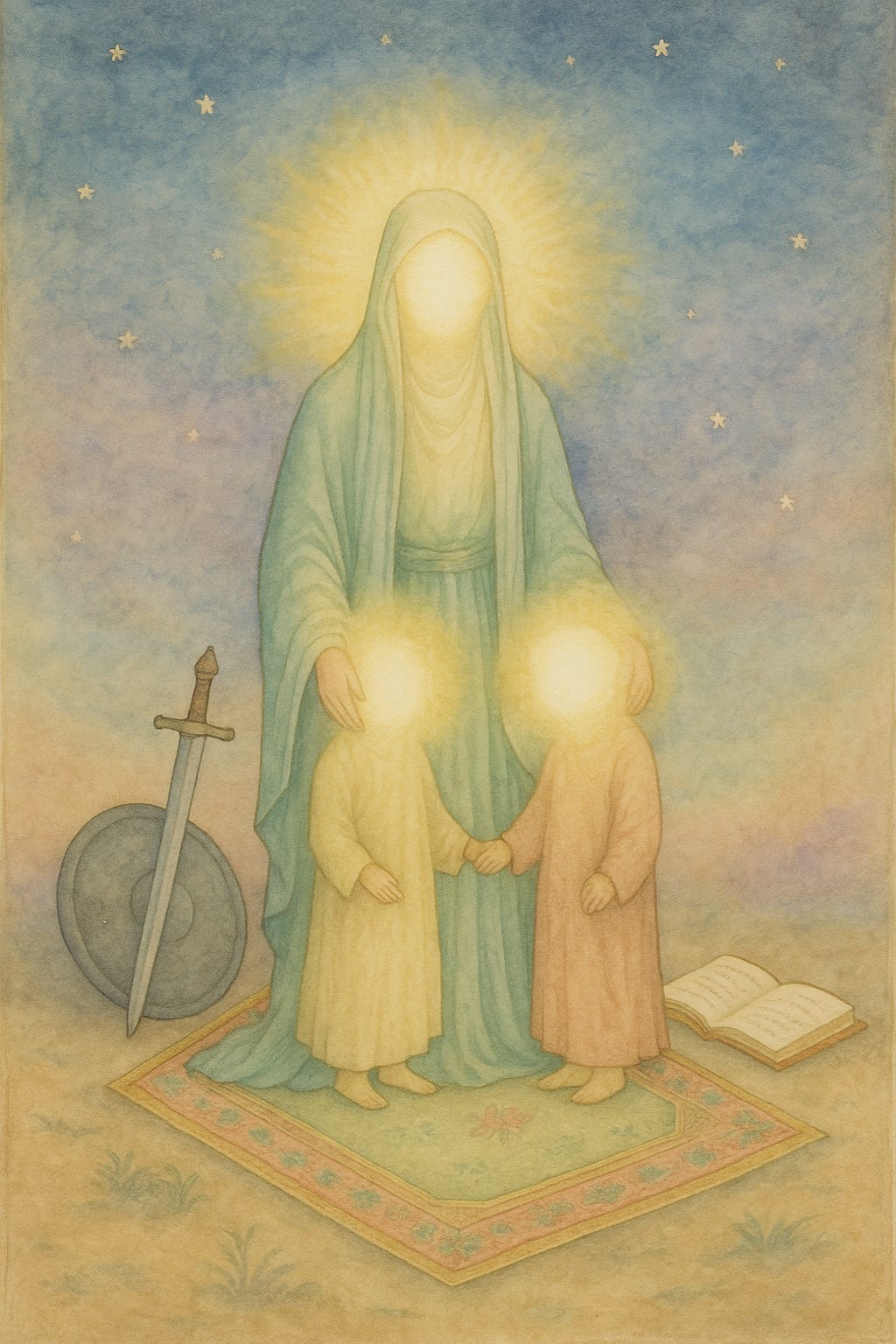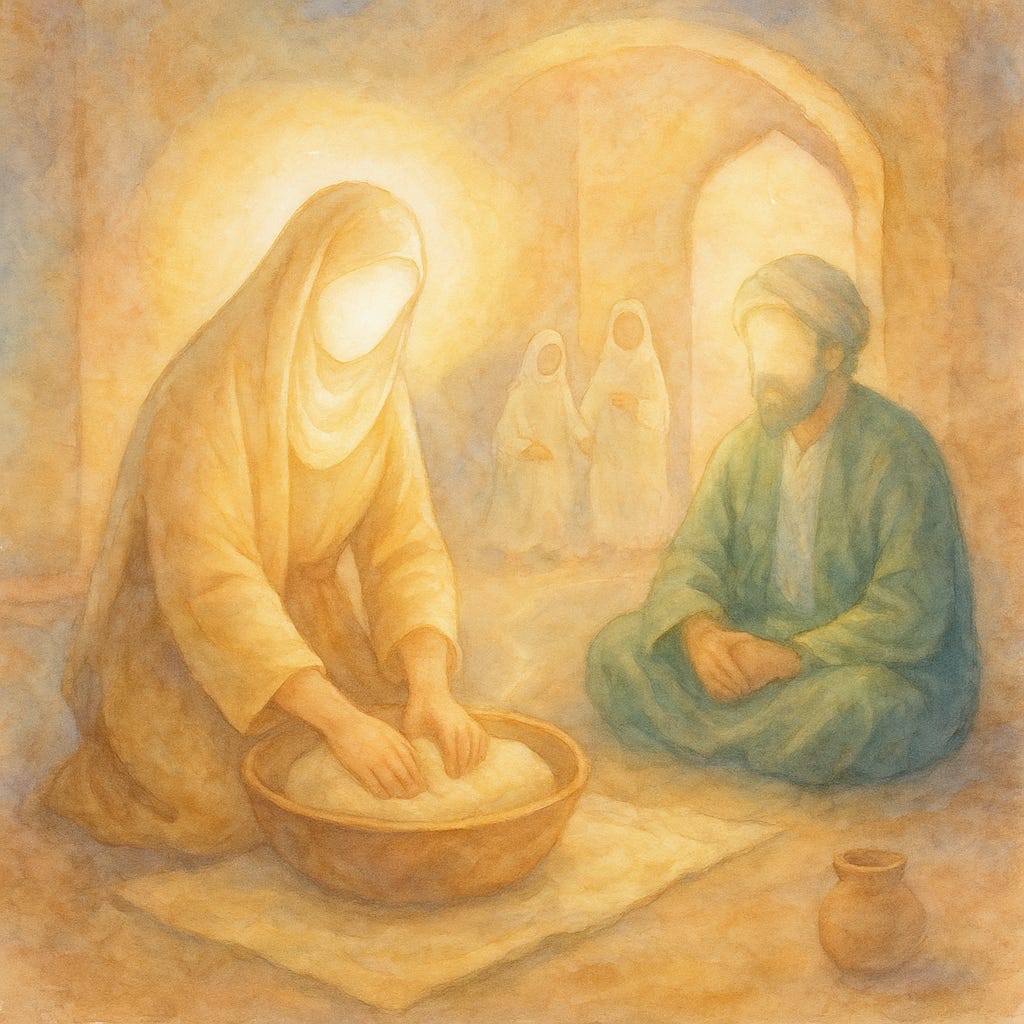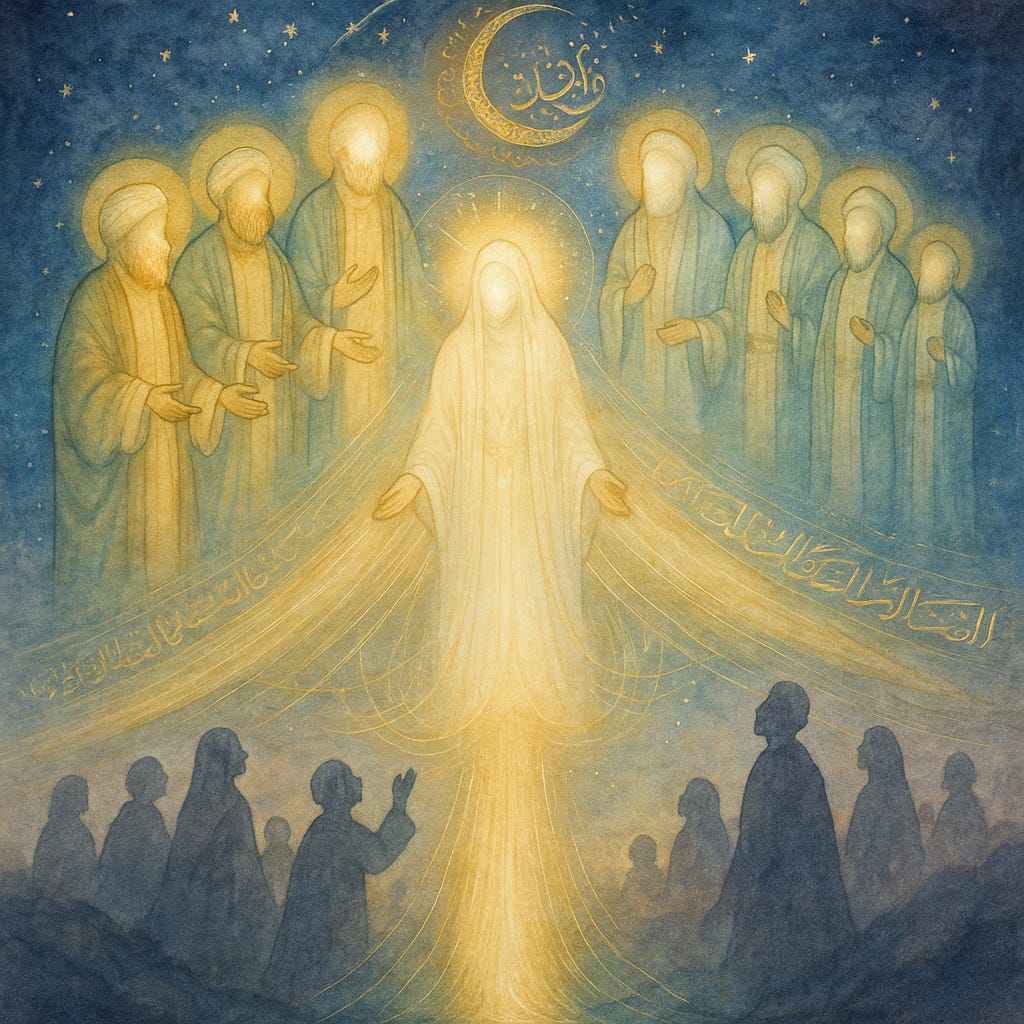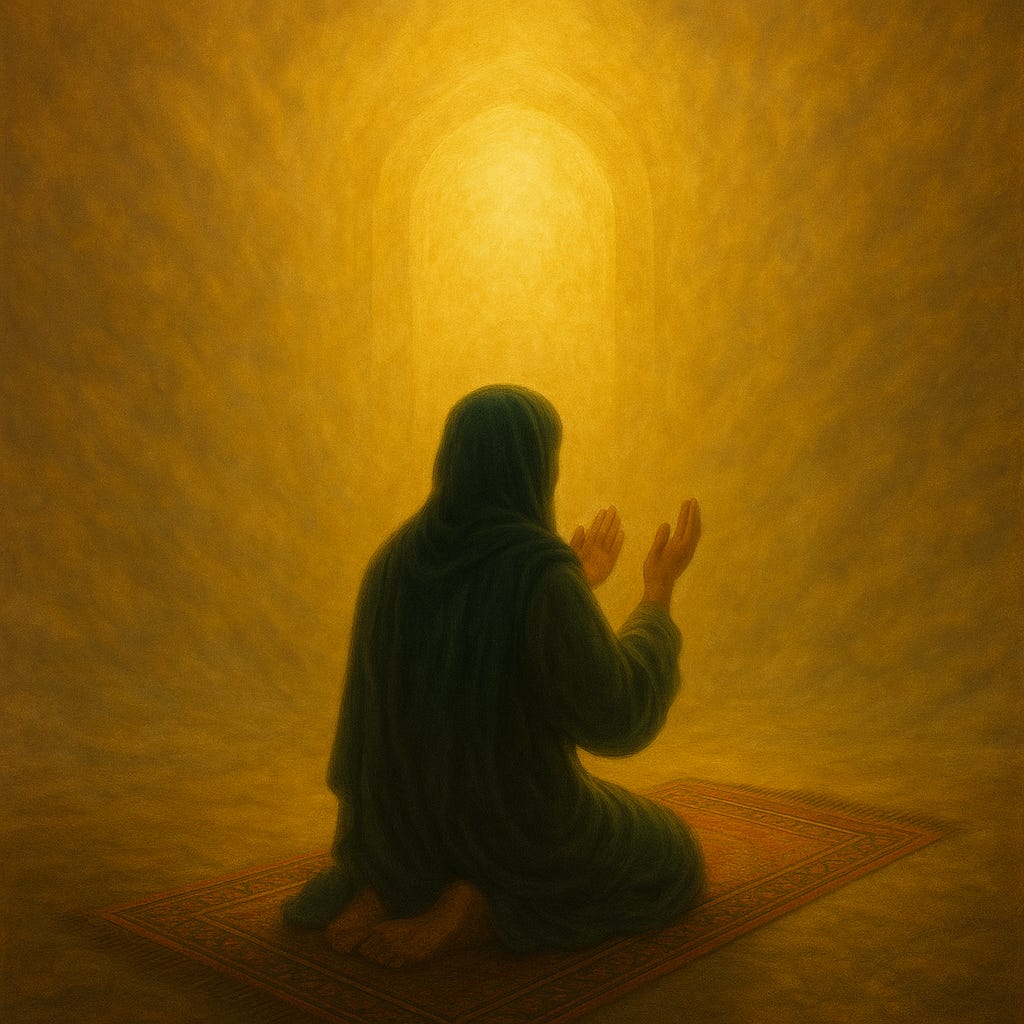[25] Imamah (Leadership) - The Lady of Light and the Mother of the Imams, Sayyedah Fatimah az-Zahra
A series of discussions on the teachings of Imam Sadiq (sixth Imam of the Muslims), from the book Misbah ash-Sharia (The Lantern of the Path)
In His Name, the Most High
This is part twenty-five of an ongoing series of discussions on the book attributed to Imam as-Sadiq entitled ‘Misbah ash-Sharia’ (the Lantern of the Path).
As is the case for each of the sessions in this series (and previous series), there is a requirement for the reader to at the very least take a cursory look at the previous sessions - though studying them properly is more beneficial - as the nature of this subject matter requires a building up of understanding in a step by step manner.
Since each session builds on the one before, it is crucial that the previous sessions are studied - at least in a cursory manner, though fully is more beneficial - so we can try to ensure that misunderstandings and confusion do not ensue, as well as ensure we can garner more understanding from each session.
The previous parts can be found here:
Video of the Majlis (Sermon/Lecture)
This write up is a companion to the video majlis (sermon/lecture) found below:
Contents
Majlis - Misbah ash-Sharia - Servitude - Part 25 - Imamah - The Lady of Light and Mother of the Imams, Sayyedah Fatimah az-Zahra
Nasheed -The Most Gracious Mother - Hajj Mahdi Rasouli (Poetic Inspirational English Translation)
Ziyarah - Ziyarat Aal-i-Yaseen
Recap
In our previous session — the twenty-fourth in our ongoing journey through Misbah ash-Sharia (The Lantern of the Path) — we stood in the exemplary shadow of the Commander of the Faithful, Imam Ali ibn Abi Talib (peace be upon him), and sought to understand the doctrine of Imamah not as a mere historical succession, but as the living axis of divine guidance in the world.
We traced the contours of Imamah as articulated in Shia theology: a divinely mandated leadership, inseparable from the mission of the Prophet Muhammad (peace and blessings be upon him and his family), and rooted in the qualities of infallibility, divine knowledge, and moral perfection. We reflected on how the Imam is not simply a political figure, but the spiritual heart of the Ummah — the one through whom the light of Prophethood continues to illuminate the path of humanity.
Our exploration led us through the epochs of early Islamic history: from the era of strategic patience and preservation following the Prophet’s departure, through the brief but radiant caliphate of Imam Ali, and into the long night of resistance and perseverance that defined the lives of the Imams under Umayyad and Abbasid rule. We saw how the Imams, far from being passive or withdrawn, embodied a continual, adaptive struggle — their every action a manifestation of divine duty, their every sacrifice a proof against tyranny.
Central to our discussion was the unique station of Imam Ali: his unwavering justice, his selfless service, and his refusal to compromise the principles of Islam for the sake of power or expediency. We examined the trials he faced — from the usurpation of his right, to the betrayals and rebellions that marked his caliphate — and how, through it all, he remained the paragon of integrity, humility, and God-consciousness. His life became the eternal criterion by which all claims to leadership and justice must be measured.
We also reflected on the triad that defines his legacy: majesty, oppression, and victory. Despite the relentless injustices he endured, Imam Ali’s triumph was not in worldly conquest, but in the enduring radiance of his example — a victory sealed in the prayer-niche of martyrdom, and echoed in the hearts of all who seek truth.
As we concluded, we recognised that the doctrine of Imamah is not an abstract theology, but a living reality — one that demands both intellectual clarity and spiritual allegiance. The path of Ali is not merely to be admired, but to be walked: a path of sacrifice, discernment, and unwavering commitment to divine justice.
With this foundation, we now turn our gaze to the radiant figure of Sayyedah Fatimah al-Zahra (peace be upon her) — the mother of the Imams, the bridge between Prophethood and Imamah, and the axis around which the entire structure of divine guidance revolves. Her station, her sacrifice, and her centrality in the unfolding of God’s plan will be the focus of our next reflection, as we seek to understand the indispensable role she plays in the architecture of spiritual succession.
In the name of the Lord of Muhammad, Ali, and Fatimah, we proceed …
Imamah (Leadership) - The Lady of Light, and Mother of the Imams, Sayyedah Fatimah az-Zahra
The Ocean of Virtues in Sayyedah Fatimah az-Zahra
Her Qualities Are Not Countable
The virtues of Sayyedah Fatimah az-Zahra are not confined to a small list, unlike those of ordinary human beings which are inherently limited.
From both a rational and practical perspective, it becomes evident that humanity is indebted to her—an assertion that may sound exaggerated, yet it is grounded in reality.
Just as the world owes a debt to Islam, to the Holy Quran, and to the teachings of the prophets—especially the final Prophet, Muhammad —so too does it owe a debt to the person of Sayyedah Fatimah az-Zahra.
History bears testimony that her light and her ideals continue to radiate across time, becoming more apparent and impactful with each passing day.
This radiance is not merely historical—it is experiential, something people continue to feel in their lives.
Our duty, in the present era, is to align ourselves with her sanctified household.
Clinging to the Household: Brotherhood and Love
It is no easy task to truly affiliate oneself with the Ahl al-Bayt—to belong to their wilayah (guardianship/authority) and be recognised as one of their adherents.
Among the phrases found in the ziyaraat (salutations) is:
نحن معروفون بولایتكم و مودتكم
“We are recognised by our love and allegiance to you.”
This phrase identifies two central responsibilities placed upon us: love (mawaddah) and allegiance (wilayah). These two pillars constitute the abundance of goodness foretold in the Quran:
إِنَّا أَعْطَيْنَاكَ الْكَوْثَرَ
“Indeed, We have given you Kawthar (abundance).”
—Quran, Surah al-Kawthar (the Chapter of the Abundance) #108, Verse #1
According to numerous exegetes, “Kawthar” is none other than Sayyedah Fatimah az-Zahra, the spiritual fountainhead from which the teachings of the Prophetic religion continue to flow to all of humanity and even the broader creation.
Attempts have been made throughout history to obscure this truth, but they have failed. The Quran affirms:
يُرِيدُونَ لِيُطْفِئُوا نُورَ اللَّهِ بِأَفْوَاهِهِمْ وَاللَّهُ مُتِمُّ نُورِهِ وَلَوْ كَرِهَ الْكَافِرُونَ
“They wish to extinguish the light of God with their mouths, but God shall complete His light, though the faithless should be averse.”
—Quran, Surah al-Saff (the Chapter of the Ranks) #61, Verse #8
Therefore, we are called upon to diminish the distance between ourselves and this divine centre of radiance. The closer we draw to her, the more we ourselves will be illuminated—not merely through love, but through action: through righteous deeds, the embodiment of loyalty, and sound belief.
These are not optional; they are the requirements set upon the followers of the Ahl al-Bayt.
True allegiance demands action.
To simply declare oneself a follower is not sufficient.
One cannot merely claim a connection by proximity, such as being “the bark on the door of Imam Ali”, without embodying their teachings.
One cannot invoke the tradition:
سَلْمَانُ مِنَّا أَهْلَ الْبَيْتِ
“Salman is from us, the Ahl al-Bayt,”
—Al-Kulayni, al-Kafi, Vol. 2, Page 254
—while neglecting to act as Salman did. The Shia community—those who profess devotion to the household—must be able to bear the gaze of these noble ones and be recognised not by their claims, but by their deeds.
We aspire for our hearts to be seen as close to the Ahl al-Bayt, but this nearness is not conferred through verbal declarations. It is attained through forgiveness, sacrifice, virtue, and striving to reflect their character.
The Divine Selection and Trials of Sayyedah Fatimah al-Zahra
Virtue Revealed in Youth
When did these radiant virtues begin to manifest from Sayyedah Fatimah az-Zahra?
Was it over a lifetime of accumulated wisdom?
No—her refulgence emerged in the tender years of youth.
Whether she departed this world at the age of 18, 20, or 25—according to differing narrations—all accounts confirm that her virtues had already blossomed and matured in full.
Such excellence is not accidental. It is the fruit of divine knowledge and selection. God, the Almighty, tested and purified her before even creating her:
فَإِنَّكَ خُلِقْتَ قَبْلَ أَنْ تُخْلَقِي وَوُجِدْتِ قَبْلَ أَنْ تُوجَدِي، فَوَجَدَكِ لِمَا امْتَحَنَكِ صَابِرَةً
“You were examined by the God who created you before He brought you into existence, and He found you patient.”
—Rawdat al-Muttaqeen, commentary on Man La Yahdharuhu al-Faqih1, Vol. 5, p. 343
The divine examinations are never arbitrary. God does not elevate someone without knowledge of their worth. Every gift from Him is meticulously calculated, as the Quran affirms:
وَكُلُّ شَىْءٍ عِندَهُۥ بِمِقْدَارٍ
“And everything with Him is by measure.”
—Quran, Surah al-Raʿd (the Chapter of the Thunder) #13, Verse #8
Hence, the selection of Sayyedah Fatimah az-Zahra as a centre of divine light was not based on lineage alone.
Her inner truth—her forbearance, knowledge, self-sacrifice, and alignment with the divine will—made her deserving of such a station.
God knew she would pass every test, and thus He adorned her with a light so brilliant that even the angels are awestruck by her presence.
A Beacon for the Path of God
Imam Khamenei relates from the traditions that the brilliance of Sayyedah Fatimah az-Zahra is so intense that it dazzles the vision of angels.
For them, she is a radiant star.
But for us?
She is a guidepost on the path to God—a path she herself traversed with utmost purity and strength, ascending to the highest spiritual stations.
Her transcendent nature is not mythical; it is grounded in the divine principle of reward through sincere striving.
As mentioned previously:
اللَّهُ خَالِقُكِ قَبْلَ أَنْ يَخْلُقَكِ وَامْتَحَنَكِ فَوَجَدَكِ صَابِرَةً
“God, your Creator, examined you before creating you, and He found you through that trial to be patient.”
God’s kindness to her was not baseless emotion—it was justice based on knowledge.
Divine generosity follows divine foreknowledge of virtue.
Were there not many people with good inclinations?
Yes, but few are those who pass every divine test.
Sayyedah Fatimah az-Zahra, was among the rare ones who succeeded completely.
This, then, is the secret of her spiritual stature: she earned it through struggle. And it is this example that is most critical for us to internalise. As the Prophet, the peace and blessings of God be upon him and his family, once addressed her:
قال رسول الله (ص)
يا فاطمة بنت محمد! اعملي لما عند الله، فإني لا أغني عنك من الله شيئا“O Fatimah, daughter of Muhammad! Work for what is with God, for I will not avail you against God in anything.”
—Sahih al-Bukhari, Book of Tafsir, Hadeeth #4771; Book of Prophets, Hadeeth #3535
—Sahih Muslim, Book of Faith, Hadeeth #203
—Al-Majlisi, Bihar al-Anwar, Vol. 22, p. 476, old edition; Vol. 43, p. 54, new edition
—Ibn Shu’ba al-Harrani, Tuhaf al-‘Uqul p. 52, Dar al-Ma’rifa edition
—Shaykh al-Saduq, Al-Amali Majlis (Session) #1, Hadeeth #8)
Even she, the beloved of the Messenger of God, was reminded that spiritual elevation comes through action—not status. And she lived accordingly. Her life was a continuous effort, a model for all believers.
The “Mother of Her Father” — A Title Earned in the Furnace of Struggle
Her Childhood in the Valley of Abu Talib
Sayyedah Fatimah az-Zahra was still a child—just six or seven years old—when she was subjected to one of the most difficult trials of early Islam: the boycott and exile to the Valley of Abu Talib (Shayb-e-Abi Talib).
Her young age did not shelter her from hardship. Rather, it was in this crucible of suffering that the spiritual mettle of Sayyedah Fatimah began to shine with clarity.
During this early phase of the Prophet’s public mission, the Quraysh and other powerful tribes of Makkah sought to isolate and suppress the Messenger of God and his supporters.
Alongside tens of families—including the Prophet himself, his noble uncle Abu Talib, and their kin—she was forced into exile.
Abu Talib provided them refuge in a mountainous region outside Makkah, known as the Valley of Abu Talib. There, the conditions were extreme: blistering heat during the day, freezing cold at night, hunger, thirst, and fear. The believers remained in this state of siege for three full years.
And who was by the side of the Prophet during these harsh years? It was the small yet resolute figure of his daughter, Sayyedah Fatimah az-Zahra, embodying a love and loyalty beyond her years.
The Birth of a Title: “Umm Abiha” (the Mother of her Father)
In these early tribulations, Sayyedah Fatimah was not merely a child. She became a source of comfort, support, and strength for her father, whose heart was burdened with profound loss: first the death of his beloved wife Sayyedah Khadijah, and soon after, the passing of his great protector, Abu Talib. The Prophet faced unbearable grief and isolation.
It was during this time that Sayyedah Fatimah, still in her early childhood, rose to the task.
She comforted the Prophet, wiped the dust of sorrow from his blessed face, and offered him companionship and consolation in a world turning increasingly hostile.
It is for these acts of loyalty and love that she was given the title:
أُمُّ أَبِيهَا
“The mother of her father.”
—Al-Majlisi, Bihar al-Anwar, Vol. 43, p. 16
The Prophet—a man of profound spiritual insight, the bringer of divine revolution, and the Mercy to the worlds—did not bestow such a title sentimentally.
It was earned.
Sayyedah Fatimah az-Zahra displayed such nurturing strength and unwavering presence that she embodied the role of a mother for her father. Her maturity—spiritual and emotional—was far beyond her years.
It should be remembered that in the Arabian Peninsula, particularly in the harsh climates of the Hijaz, girls matured faster physically and mentally.
A ten-year-old in that society was akin in maturity to a twelve-year-old elsewhere. But even with that taken into account, Sayyedah Fatimah’s role at such a young age remains extraordinary.
She became a shining role model—not only for daughters, but for youth everywhere—showing that age is not a barrier to meaningful contribution, to responsibility, or to spiritual refinement.
A Kiss Beyond Emotion — The Prophet’s Honour of Sayyedah Fatimah
An Expression of Recognition, Not Sentiment Alone
Among the many deeply symbolic actions of the Prophet Muhammad was his practice of standing up to receive Sayyedah Fatimah az-Zahra, seating her in his place, and kissing her hands.
These acts were not gestures of ordinary affection; they carried weighty meanings.
To presume that the Prophet, a man of supreme wisdom, justice, and balance, would act merely out of personal sentiment diminishes both his stature and hers.
It would be unjust to interpret these profound actions as those of a father moved solely by emotion.
No—these honours bestowed upon Sayyedah Fatimah signified her exceptional station.
She had, by her youth, already reached the pinnacle of spiritual royalty. Her personality was not simply exemplary—it was extraordinary.
Islam does not recognise mere lineage or gender as the basis of spiritual honour. Rather, it is righteousness, steadfastness, and divine service that elevate a human being.
And in Sayyedah Fatimah az-Zahra, all these traits converged.
The Prophet honoured her not only as his daughter but as a sanctified servant of God whose moral and spiritual stature deserved reverence.
In this, he demonstrated to the world what Islam demands of us regarding women: respect, not as a favour, but as a recognition of true excellence.
Her Spiritual Reality Transcends Her Jihad
Sayyedah Fatimah’s position is not merely that of a revolutionary figure or a supporter of political truth.
Her reality is spiritual first and foremost—an immaculate essence, a purified light (nur), a person whose inner being was so elevated that even the angels were in awe.
As narrated by the Prophet, he once said to the Commander of the Faithful, Imam Ali:
ثم قال (عليه السلام)
يا علي أنت إمام أمتي وخليفتي عليها بعدي وأنت قائد المؤمنين إلى الجنة وكأني أنظر إلى ابنتي فاطمة قد أقبلت يوم القيامة على نجيب من نور عن يمينها سبعون ألف ملك، وعن يسارها سبعون ألف ملك، وبين يديها سبعون ألف ملك، وخلفها سبعون ألف ملك، تقود مؤمنات أمتي إلى الجنة..."O Ali, you are the Imam of my community and my successor over them after me, and you are the leader of the believers to Paradise. And it is as if I see my daughter Fatimah coming on the Day of Resurrection riding a mount of light, on her right are seventy thousand angels, on her left are seventy thousand angels, in front of her are seventy thousand angels, and behind her are seventy thousand angels, leading the believing women of my community to Paradise..."
—Al-Majlisi, Bihar al-Anwar, vol. 43, p. 24
—Shaykh al-Saduq, Al-Amali, p. 291
This noble narration affirms that just as Imam Ali shall lead the believing men to Paradise, Sayyedah Fatimah az-Zahra will lead the believing women. She stands as his equal in spiritual responsibility, guidance, and divine trust.
She is the echo of the angelic salutation to the blessed Saint Mary in the Quran, as narrated in this hadeeth from Prophet Muhammad::
...وإنها لتقوم في محرابها فيسلم عليها سبعون ألف ملك من الملائكة المقربين وينادونها بما نادت به الملائكة مريم فيقولون: يا فاطمة (إن الله اصطفاك وطهرك واصطفاك على نساء العالمين)
"...And she (Fatimah) stands in her prayer niche, and seventy thousand angels from among the nearest angels greet her and call her with what the angels called Maryam, saying:
يَا فَاطِمَةُ، إِنَّ ٱللَّهَ ٱصْطَفَىٰكِ وَطَهَّرَكِ وَٱصْطَفَىٰكِ عَلَىٰ نِسَآءِ ٱلْعَٰلَمِينَ
'O Fatimah, God has chosen you, and purified you, and chosen you above the women of the worlds.'"
—Paraphrased from: Quran, Surah Aal-i-Imraan (the Chapter of the Family of Imraan) #3, Verse #42 — originally addressed to Saint Mary
—Al-Majlisi, Bihar al-Anwar, vol. 43, p. 24
—Shaykh as-Saduq, Al-Amali, Majlis (Session) #27, p. 291
The spiritual status of Sayyedah Fatimah az-Zahra cannot be fully comprehended by ordinary intellects.
The angels themselves speak with her, converse with her, and honour her.
She belongs to that rare category of purified souls—other than prophets—who receive divine intimations through angelic means.
Her light stands before all women of the world, calling them to the path of righteousness, elevation, and nearness to God.
Sayyedah Fatimah az-Zahra as a Challenge to Materialist Conceptions of Womanhood
Spiritual Radiance vs. Worldly Ornamentation
Across centuries, both in the age of ignorance (jahiliyyah) and in modern times, women have been portrayed and valued primarily through their appearance, possessions, and roles in the worldly domain—clothing, jewellery, and beauty. In this shallow framework, womanhood is often reduced to ornamentation and spectacle.
But Sayyedah Fatimah az-Zahra stands as a divine refutation of this narrative.
Her spiritual light—her truth, character, and transcendence—melts away the icy constructions of fashion, glamour, and superficiality like snow under the sun. Her life challenges and dismantles the logic that attempts to define a woman by her outward display rather than by her inward essence and purposeful action.
Islam introduces Sayyedah az-Zahra as the paragon of womanhood—not because she withdrew from life, but because she embraced it with prophetic purpose.
She embodied the spiritual, social, intellectual, and political dimensions of human potential.
Her words, actions, sacrifices, relationships, and intellect all reflect the comprehensive role that Islam envisions for a woman.
A Life That Demanded Reverence
Her outward life was steeped in struggle (jihad), sacrifice, eloquence, and learning. Her treatment of her husband, motherhood, and presence in the political, public, and metaphysical arenas compelled respect from all who encountered her.
She was:
A worshipper whose prayer mat was soaked with tears.
A wife to a man whose life was entirely dedicated to struggle (jihad).
A mother who raised the likes of Imam Hasan, Imam Husayn, and Sayyedah Zaynab.
A teacher and counsellor.
A defender of prophethood, imamah, and justice.
A political figure who, after the Prophet’s demise, stood in the mosque and delivered a speech so eloquent that scholars compared it to the sermons of Nahjul Balagha.
Even within her short life—be it 18, 20, or 25 years—Sayyedah Fatimah compressed within herself an ocean of duty, sacrifice, and greatness.
Her martyrdom was the culmination of a life of struggle (jihad) and resistance.
This is the Islamic model of a woman:
spiritual depth,
principled activism,
intellectual force,
domestic strength, and
divine light
—all unified in one being.
The Integrated Life of Sayyedah Fatimah az-Zahra — A Harmonious Trinity
Spirituality, Family, and Public Responsibility United
While the depths of Sayyedah Fatimah az-Zahra’s spirituality are beyond our full comprehension—known best to God and to those who resemble her in nearness—we can still derive profound lessons from the outer, accessible aspects of her life.
There is a resplendent point in her earthly existence: the seamless combination of three essential dimensions that often appear contradictory in the modern imagination.
These are:
Her role as a Muslim woman within the home — caring for her husband and raising her children.
Her commitment to public and political life — standing for truth, defending prophethood and imamah, and actively participating in the Muslim community after the death of her father.
Her deep spiritual life — standing for worship even in the dead of night, communing with God in supplication and divine intimacy.
What is striking about Sayyedah Fatimah az-Zahra is that she did not separate or sacrifice one aspect for the sake of another.
In her, these realms—often seen as mutually exclusive—converged and complemented each other in perfect harmony.
Islamic Integration, Not Secular Division
Contemporary societies often presume that a person cannot be both spiritually devout and politically engaged; or that a woman who is publicly active must necessarily neglect her family life; or that the domestic sphere is incompatible with elevated intellect or revolutionary activism.
But Islam rejects this dichotomy.
Sayyedah Fatimah az-Zahra stands as a living testament to the integration of worship, family, and activism.
Her spirituality strengthened her public voice; her public mission was rooted in her commitment to divine justice; her domestic life was the soil in which divine values were nurtured.
This unity is what makes her an unmatched model. She was not just a woman of prayer, nor solely a political voice, nor merely a dutiful wife and mother—she was all of them, synchronised in perfect alignment with the divine will.
She is, therefore, a role model for all: women and men, private believers and public servants, spiritual aspirants and social activists.
Sayyedah Fatimah az-Zahra — Daughter of Revolution, Wife of a Mujahed (One who struggles in the way of God)
Raised Amidst Struggle, Married into Jihad
Sayyedah Fatimah az-Zahra was born into a house forged in the crucible of divine revolution.
Her parents—Prophet Muhammad and Sayyedah Khadijah—were not mere participants in social reform; they were the pioneers of a global transformation that would challenge every oppressive structure on Earth.
From infancy, Sayyedah Fatimah tasted the hardships of her father’s mission, including exile, hunger, and fear in the Valley of Abu Talib.
And her struggles did not end with childhood. She married a man whose life was utterly immersed in jihad (struggle) for the sake of God: Imam Ali ibn Abi Talib , the standard-bearer of divine justice and courage.
For nearly twelve years of their marriage, Imam Ali was either on the battlefield or preparing for one. And what did Sayyedah az-Zahra do?
She never once complained.
She never placed personal comfort above duty.
She never withheld support from her striving husband.
This is not the tale of a passive figure waiting at home—it is the story of a partner in divine revolution, whose inner strength sustained and complemented her husband’s external efforts.
A Life of Relentless Devotion and Martyrdom
Though her earthly life was short—no more than two and a half decades—it was overflowing with effort, knowledge, resistance, and spiritual work. Her contributions in defending the Prophet, supporting the Commander of the Faithful, Imam Ali, and preserving the Islamic system after the Prophet’s passing, formed an ocean of dedication that culminated in martyrdom.
Her speech in the Mosque of Madinah, delivered after the Prophet’s death, is one of the clearest proofs of her brilliance.
Addressing a crowd of men in pain and grief, she spoke with such eloquence and depth that the great scholar Allamah al-Majlisi remarked:
قال العلامة المجلسي:
لا يليق أن يترجم هذا الكلام إلا من كان عارفاً بفنون البلاغة، متبحراً في العربية، حتى لا يضيع رونق الكلام وجمالهAllamah Majlisi said:
"It is not appropriate for this speech to be translated except by one who is knowledgeable in the arts of eloquence and deeply versed in Arabic, so that the beauty and elegance of the speech are not lost."—Al-Majlisi, Bihar al-Anwar, Volume 29, p 221 (Introduction to the Sermon of Fatimah)
The sermon, recorded in its entirety in classical texts, resembles the elevated language of Nahjul Balagha. It stands as one of the greatest orations in Islamic history—delivered by a young woman under duress and grief.
The Memory of the Arabs and the Permanence of Truth
The Arabs were known for their oral precision. A poet could recite eighty verses extemporaneously, and multiple listeners would retain it by heart. It is through this oral tradition that many poems and speeches have reached us. But not all words survive in the annals of time.
Only what is profound, sincere, and divinely aligned persists. That Sayyedah Fatimah az-Zahra’s sermon has remained central to Muslim memory for nearly fourteen centuries is itself testimony to its greatness.
Trivial words vanish.
Truth endures.
Her speech was not just historical. It was a blueprint. It is a role model for every woman—indeed, for every believer—who seeks to speak for justice while remaining anchored in faith.
Mistress of Worship, Model of Household Grace
Worship that Transcended the Physical
The spiritual worship of Sayyedah Fatimah az-Zahra was not a ritual of form—it was a sacred act of complete devotion, embodying her intimate connection with God. Her worship became a model not only for women but for all spiritual seekers.
Even the most pious of men in later generations were humbled by her devotion. The renowned ascetic Hasan al-Basri remarked:
عن أبي عبد الله عليه السلام قال: كانت فاطمة عليها السلام تقوم في محرابها حتى تورمت قدماها
From Abu Abdullah (Imam Ja‘far al-Sadiq, peace be upon him):
“Fatimah (peace be upon her) used to stand in her prayer niche (mihrab) (worshiping God) until her feet became swollen.”
—Ibn Shahrashub, Manaqib Aal Abi Talib (Virtues of the Family of Abu Talib), Volume #3, Page 341
Her son, Imam Hasan al-Mujtaba, the second Imam of the Muslims, recalled:
قال الحسن بن علي عليهما السلام: رأيت أمي فاطمة عليها السلام قامت في محرابها ليلة جمعتها، فلم تزل راكعة ساجدة حتى اتضح عمود الصبح، وسمعتها تدعو للمؤمنين والمؤمنات، وتسميهم وتكثر الدعاء لهم، ولا تدعو لنفسها بشيء، فقلت لها: يا أماه، لم لا تدعين لنفسك كما تدعين لغيرك؟ فقالت: يا بني، الجار ثم الدار.
Imam Hasan ibn Ali (peace be upon them) said:
"I saw my mother Fatimah (peace be upon her) stand in her prayer niche on the night of Friday. She continued to bow and prostrate until the dawn appeared. I heard her praying for the believers, men and women, mentioning them by name, and praying abundantly for them, but she did not pray for herself at all. So I said to her, 'O mother, why do you not pray for yourself as you pray for others?' She replied, 'O my son, the neighbour first, then the household.'"
—Ibn Shahrashub, Manaqib Aal Abi Talib (Virtues of the Family of Abu Talib), Volume #3, Page 343
—Al-Majlisi, Bihar al-Anwar, Volume 43, Page 81
This simple reply reveals the vastness of her soul and the depth of her compassion—prioritising the needs of the community over her own, even in the most intimate moments of prayer.
A Wife as Islam Envisions
Despite her elevated spiritual rank, Sayyedah Fatimah az-Zahra, never allowed her closeness to God to make her detached from her domestic duties.
She fulfilled her role as a wife to Imam Ali with humility, kindness, and diligence.
Imam Ali himself testified:
فَوَاللَّهِ مَا أَغْضَبَتْنِي وَلَا عَصَتْ لِي أَمْرًا
“By God! She never angered me, nor did she ever disobey any of my commands.”
—Al-Majlisi, Bihar al-Anwar, Volume 43, Page 134
Such a statement from the most just and eloquent man after the Prophet is not a trivial compliment. It is a witness to her exemplary character.
Sayyedah Fatimah az-Zahra managed her household with integrity. She raised children who became leaders of humanity. She brought comfort to her husband and joy to her father. She never allowed worldly temptations to divert her from the divine path.
She was not “beyond” being a wife or a mother, despite her exalted station.
Rather, she embraced these roles with full sincerity, demonstrating that spiritual height is not opposed to familial devotion—but is, in fact, realised through it.
Embodiment of Generosity and Self-Sacrifice
Charity from a Home of Simplicity
The generosity of Sayyedah Fatimah az-Zahra was not born from wealth or comfort. Her home was simple—often materially deprived—but her spirit was rich with compassion.
There is a well known episode, narrated by Imam as-Sadiq and found in Bihar al-Anwar:
عن الإمام الصادق عليه السلام
أن رجلاً أتى النبي صلى الله عليه وآله وسلم فشكا إليه الجوع، فبعثه إلى بيوت أزواجه، فلم يجد عندهن شيئاً، فقال: من لهذا؟ فقال علي عليه السلام: أنا يا رسول الله، فأتى فاطمة عليها السلام فقال: يا بنت رسول الله، هل عندك شيء تطعمينا؟ فقالت: والذي أكرم أبي بالنبوّة ما عندنا إلا جلد كبش، أعطيك إياه، فقال: هاتيه، فأتته به، فأخذه وجاء به إلى النبي صلى الله عليه وآله وسلم، فقال النبي: أما إن الله قد أعطاك ما هو خير منه في الدنيا والآخرةImam al-Sadiq (peace be upon him) said:
"A man came to the Prophet (peace be upon him and his family) and complained of hunger.
The Prophet sent him to the houses of his wives, but nothing was found with them.
The Prophet then said:
'Who will take care of him?'
Imam Ali (peace be upon him) said:
'I will, O Messenger of God.'
He went to Fatimah (peace be upon her) and said:
'O daughter of the Messenger of God, do you have anything to feed us?'
She replied:
'By Him Who honoured my father with Prophethood, we have nothing except a ram's skin, which I will give you.'
He said:
'Bring it.'
She brought it to him, and he took it to the Prophet.
The Prophet said:
'Indeed, God has given you something better than this in this world and the Hereafter.'"
—Al-Majlisi, Bihar al-Anwar, Volume 43, Page 54
This act was not just charity—it was pure altruism, for she gave from what she could not replace. She placed the need of another over the comfort of her own children.
Such incidents demonstrate why Sayyedah az-Zahra is more than a historic figure.
She is a universal role model—a woman who embodies the Islamic ideal in every domain: in knowledge, worship, sacrifice, modesty, family, and public responsibility.
An Islamic Woman, A Nation-Builder
The Islamic woman, as exemplified by Sayyedah Fatimah az-Zahra, is not passive, nor dependent, nor ornamental.
She is a maker of societies, a nurturer of souls, a producer of true humanity.
A mother, as the ahadeeth (traditions and narrations from the Prophet and his family) and history affirm, shapes destinies in ways that even the greatest scientists cannot.
Scientists may invent missiles or machines, but they cannot manufacture hearts and minds.
Only a mother can do that.
Hence, Islam places the mother above all creators of civilisation—because she creates the civilised person.
Sayyedah Fatimah az-Zahra is not merely a role model for Muslim women.
She is a blueprint for the Islamic vision of womanhood: firm in faith, strong in family, radiant in worship, generous in action, and resolute in truth.
Sayyedah Fatimah az-Zahra — The Everlasting Standard of Islamic Womanhood
A Comprehensive Legacy
The life of Sayyedah Fatimah az-Zahra offers a comprehensive, effulgent standard for what Islam envisions in an ideal woman.
She was not confined to a single domain of excellence but excelled in every realm of human responsibility:
She was a servant of God, known for her night prayers, weeping in prostration (sujud), and profound spirituality.
She was a faithful and supportive wife, standing beside Imam Ali through battles, hardships, and political upheavals.
She was a compassionate mother, nurturing the Imams Hasan and Husayn and Sayyedah Zaynab—personalities who would each bear monumental responsibilities for Islam.
She was an eloquent and principled public speaker, defending the truth of wilayah (guardianship) and nubuwwah (prophethood) in the mosque with clarity and courage.
She was a symbol of sacrifice, whose martyrdom was not accidental, but the final act in a lifetime of struggle for divine justice.
The Silent Light that Guides
While we may study and admire these outer actions, the inner reality of Sayyedah Fatimah az-Zahra—her spiritual brightness (nur)—remains inaccessible to most of us.
This is not because it is hidden, but because our vision is too dim to perceive it.
Her true station is fully recognised only by her father (the Prophet), her husband (Imam Ali), and her infallible children.
The rest of us are limited by weak and short-sighted eyes that cannot behold such light directly.
Thus, even though we cannot grasp her cosmic light, we can witness the way she combined the duties of worship, family, and struggle in perfect harmony. She was:
A political voice and participant in Islamic history.
A spiritual leader whom angels visited.
A household figure whose every action within the home was infused with sincerity (ikhlas).
A martyr whose death symbolised a life of devotion.
This combination—the balance between worship (ibadah), struggle (jihad), and nurturing family and society (umraan)—makes her a complete, eternal template for the Islamic woman.
A Timeless Message
Her example addresses every era and every challenge. Whether confronting societal expectations that reduce women to objects of beauty and material success, or spiritual movements that dismiss the importance of worldly engagement, or secular frameworks that pit motherhood against public leadership—Sayyedah Fatimah az-Zahra offers a unified model.
Her message is clear:
Be devoted to God. Be faithful to your family. Be fearless in public truth. Be generous to society. Be constant in prayer. Be a light in darkness.
And when all these virtues converge, even in a short life, they leave a legacy that outlives centuries.
Sayyedah Fatimah az-Zahra is not a figure confined to books or sermons—she is a pathway, a standard, a miracle in human form, and a call to every soul that seeks proximity to God through righteousness, struggle, and sincerity.
Conclusion
The Silent Axis of Divine Light
As we conclude this reflection on the Lady of Light, we must acknowledge that no amount of speech, writing, or scholarly exertion can ever do justice to the reality of Sayyedah Fatimah az-Zahra (peace be upon her). What we have attempted here is but a dim glimpse into her radiance—an echo of an echo of that primordial light through which divine grace continues to descend upon creation.
Her life, though brief in years, towers over centuries as a beacon of truth and resistance, a sanctuary of worship and sacrifice, and a furnace of divine love.
She is not merely a historical figure to be admired, nor a symbol to be praised from afar.
She is the silent axis upon which the entire edifice of Imamah revolves, the mother of the infallibles, and the proof of God upon the believers.
She is the spiritual thread that connects the message of Prophethood to the reality of Wilayah.
And she is the bridge over which all seekers must cross if they wish to truly understand the essence of divine leadership.
To know her is to recognise the weight of Wilayah.
To follow her is to adopt a life of sincerity, selflessness, and struggle. To love her is to be transformed.
And so, just as we were summoned in the previous session to walk the path of Imam Ali, we are now called to internalise the character of Sayyedah Fatimah: to live with sincerity, to worship with depth, to serve with humility, to resist with resolve, and to weep before our Lord with the pain of the oppressed and the longing of the faithful.
She is not a chapter in history—she is the pulse of divine fidelity in every era.
A Glimpse Ahead: The Forbearing Imam and the Treaty of Truth
With her luminous example now before us, we turn next to her eldest son: Imam Hasan al-Mujtaba (peace be upon him)—the second Imam, the heir of Ali, and the first divine leader to navigate the Ummah after the Prophet’s family had been politically marginalised.
In the coming session, we shall explore the profound depths of his life: his unmatched patience, his strategic silence, and his noble refusal to be drawn into bloodshed for the sake of ephemeral power. We will examine the turbulent political circumstances he inherited, and the immense burden placed upon his shoulders as the guardian of divine truth in an age of deception.
Central to our reflection will be his treaty with Muawiyyah—often misunderstood, occasionally maligned, yet in reality a masterstroke of spiritual resistance and long-term preservation of the divine message.
We will ask:
What were the aims of this treaty?
What did it prevent?
What did it preserve?
and,
What was the Imam’s vision for the Ummah (Muslim Community)?
We will seek to reclaim the legacy of Imam Hasan al-Mujtaba not as a figure of retreat or capitulation, but as a silent warrior of divine wisdom—whose outward withdrawal veiled a thunderous defence of the truth. His treaty with Muawiyyah, though repeatedly betrayed, laid bare the duplicity of those who usurped the mantle of Islam, and in doing so, set the stage for the clarifying fire of Karbala.
Without Imam Hasan’s foresight and restraint, and without the epic of Ashura that followed, the message of Islam would have been obscured, diluted, or corrupted beyond recognition.
This is the very nature of Wilayah (guardianship).
This is the essence of Imamah (leadership).
The Imam—the divinely appointed wali (representative) of God—is not bound by superficial expectations or political optics; his mission is singular:
To safeguard the essence of Islam, even at the cost of personal reputation, comfort, or authority.
We saw this divine priority in Imam Ali’s twenty-five years of outward silence following the Prophet’s death—a silence that was not submission, but a strategic preservation and protection of Islam and the Islamic Community (Ummah).
And we will see it again in Imam Hasan: a silence that thundered with divine strategy, a peace treaty that concealed a revolution, a treaty that exposed falsehood and made possible the unmasking at Karbala.
It is therefore our duty—not merely as students of history, but as seekers of divine guidance—to study these events, to reflect upon them, and to look upon the unfolding of world events through their lens.
For these are not tales of the past; they are signposts for the present and beacons for the future.
And from Him alone is all ability, and He has authority over all things.
A Supplication for the Path of Light
In Your Name, O God — the Light of the heavens and the earth,
The Sovereign of majesty and the Merciful to the broken-hearted.
O Lord of Muhammad and the family of Muhammad,
O Originator of light upon light, and mercy upon mercy.
With hearts bowed and spirits aching,
We call upon You, O Most High,
We knock at the gate of Your mercy,
With no worth of our own—only the love we bear for Your chosen ones.
Bless Muhammad, the Chosen One,
The lantern of guidance, the seal of messengers,
Whose voice carried the thunder of truth,
And whose mercy softened the hardest of stones.
Bless him with blessings that ascend beyond the heavens
And ripple through the deepest oceans of creation.
And bless his daughter, the pure, the radiant,
Sayyedah Fatimah al-Zahra—
The vessel of Kawthar, the mistress of all women,
The silent pillar, the swordless warrior,
The mother of light, who weeps for us still.
Bless Ali, the lion of tawheed,
The gate of knowledge, the neck bowed only to You,
Whose silence was louder than war-cries,
Whose sword defended only justice,
Whose love is the dividing line between belief and hypocrisy.
And bless Hasan, the patient Imam,
The peacemaker whose treaty bore the burden of betrayal,
The strategist of divine wisdom,
Whose heart bled so that the religion might live.
And bless Husayn, the sacrifice of Karbala,
The blood-letter of the covenant,
The cry that echoes through the ages:
“Is there any helper to help us?”
We were not there—
But let our tears testify that our hearts are broken still.
And bless the Imams—one by one—
Those whose names are engraved in the Tablet of Light,
Those who bore the truth in chains and in shadows,
Those who guarded Your religion when the world turned away.
O our Lord, O our King—
We beg of You, by the sanctity of Your most Beloved,
And by the tears of Sayyedah Zahra,
To anchor our hearts to their path,
To not leave us to ourselves for the blink of an eye,
And to place our feet upon the path of Wilayah—firm and unwavering.
Let us walk where they walked.
Let us speak as they spoke.
Let our love not be a hollow echo,
But a fire that burns through doubt and disobedience.
O God—
Let not our allegiance be in word alone.
Let it manifest in our deeds, in our patience,
In our courage, in our humility,
In our fight for truth,
And in our surrender to Your command.
O Nourisher of hope, O Hearer of whispers,
We turn our gaze to the one awaited—
The son of Fatimah, the proof of Your earth,
The rising sun behind the veil of clouds,
The inheritor of the Prophets, the promise of the oppressed.
O our Master, O son of Zahra—
Where are you?
Our souls ache for your presence.
Our hearts grow weary in your absence.
We see darkness prevail and we cry out for your dawn.
O God,
Make us among those who prepare for his return,
Who cleanse their hearts for his arrival,
Who await not in laziness, but in struggle,
Not in claim, but in submission.
Make us among his true Shia—
Those who obey him without hesitation,
Who sacrifice for him without complaint,
Who carry his banner without faltering.
O God,
We are unworthy, but You are the Generous.
We are broken, but You are the Healer.
Mould us into servants worthy of his army,
Engrave his love deep into our being,
And let his voice be the call our souls obey.
Hasten his reappearance, O Lord of the Throne,
And let our eyes witness the fulfilment of Your promise.
May the blessings of God be upon Muhammad and the family of Muhammad—
The ships of salvation,
The keys to Your mercy,
The embodiment of Your light.
And all praise belongs to You, O God—
The Beginning and the End.
The Manifest and the Hidden.
The Guardian of the faithful
And the Hope of those who weep at night.
Amen, O Lord of the Worlds.
Amen, O Most Merciful of the merciful.
Rawdat al-Muttaqeen Fi Sharh Man La Yahdharuhu al-Faqih (The Garden of the Pious, Commentary on He Who Has No Jurist Present) was written by Muhammad Taqi al-Majlisi al-Awwal, also known as al-Majlisi al-Kabir. It is a comprehensive commentary on the famous Shia hadeeth collection Man La Yahdharuhu al-Faqih by al-Shaykh al-Saduq.














